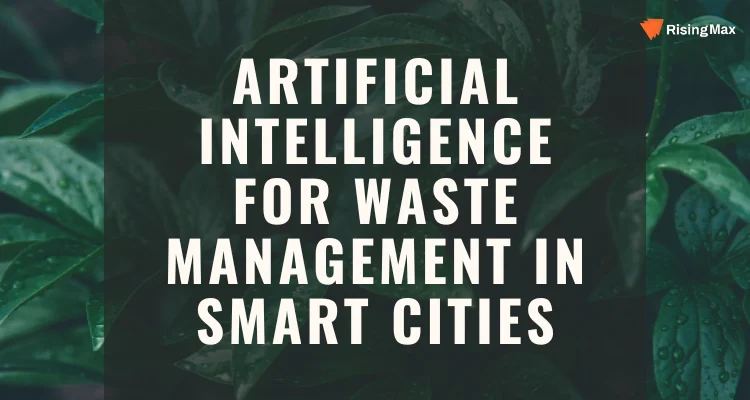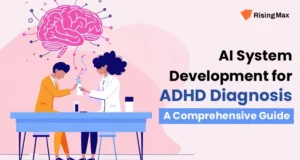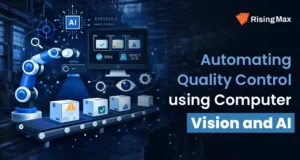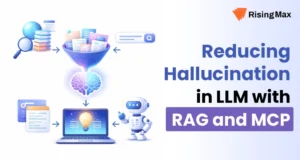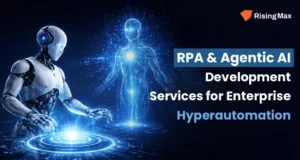The age of rapid urbanization and technological advancement is paving the way for smart cities to become a reality. The growing urban population increases the volume of waste generated. And traditional waste management systems are struggling to keep up with the volume of waste generated. This is where AI steps into the picture.

AI-powered waste management systems in smart cities are revolutionizing the waste collection and disposal process, making it more cost-effective and environmentally friendly. The new-age waste management system uses next-gen technologies like AI, ML, and data analytics to streamline and automate the entire waste collection ecosystem.
RisingMax Inc. as a leading smart city solution provider, assists businesses in creating a sustainable, connected, and tech-friendly tomorrow. Our smart city solutions leverage the power of cutting-edge technologies like AI, ML, IoT, and data analytics to build innovative solutions. Connect and discuss your smart city project idea with our expert today.
In this post, we delve deep into the AI waste management system for smart cities and how they enhance the entire waste management lifecycle with advanced algorithms, predictive analysis, and real-time monitoring.
Also Read: Artificial Intelligence (AI) Business Ideas
Artificial Intelligence & Waste Management Market Stats
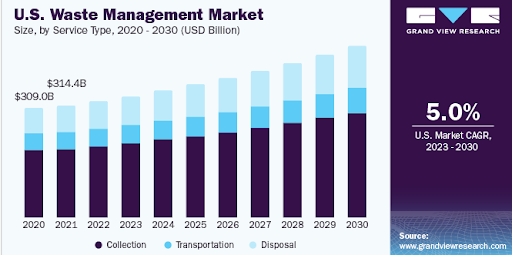
- The global waste management market is expected to reach $1.96 trillion in 2030 with an annual CAGR of 5.4 percent. (Statista)
- AI-powered waste management systems can reduce transportation distance by 36.8 percent, overall waste management time by 28.22 percent, and cost savings by 13.35 percent. (Springer Link)
- Employing artificial intelligence for waste sorting and identification can increase system accuracy from 72.8 to 99.95 percent. (Springer Link)
The increasing urbanization is pushing Governments worldwide to adopt new ways of waste management and integrate technologies like AI to increase overall efficiency. AI-based waste management solutions empower smart cities worldwide to utilize resources better and manage waste.
Want A Customized Quote For AI Waste Management Software?
If you are looking for a customized quote for your AI waste management software, then connect with our expert and share your project requirements. Our team, based on project requirements, scope, integrated features, and other requirements, share a development quote ASAP.
Creating An Interconnected AI-based Waste Management System In Smart Cities
Artificial intelligence technology plays a major role in paving the foundation of smart cities worldwide. The technologies assist in creating an ecosystem where various aspects of waste collection and management processes are automated to streamline operations and increase efficiency.
Waste Container
The integrated IoT system in the waste container raises an alert when it is completely filled with garbage. On receiving the information, the waste management system assigns the job to the waste collector. The container is either emptied in the garbage truck or replaced with an empty one.
Waste Collector
The system will assign the work to the waste collector and provide necessary details such as location, locality and estimated time to complete the job. The waste collector on completing the assigned job, will share the information, and the admin will mark the job as “Done” upon verifying.
Garbage Truck
IoT-based devices and sensors assist waste management systems to get the real-time location and assign waste collection jobs accordingly. In addition to daily waste collection, the system can assign jobs based on the current garbage truck location and waste container.
Recycling Plant
The waste management system will constantly track and monitor all the processes in the recycling plant and share real-time updates with the admin. Further, the running of the recycling plant can be managed based on the collection of waste from different corners of the smart cities.
Sort Management
The waste management software can be integrated with next-gen technologies like AI and Computer vision to streamline and automate the sort management process. The software can detect different types of garbage and sort them with waste-sorting robots.
Also Read: Use Cases Of Artificial Intelligence In Legal Industry
Benefits of AI-based Waste Management Software
Artificial intelligence is a revolutionary technology creating an indelible mark on waste management companies and businesses worldwide. The technology enhances the efficiency of recycling plants and waste management systems with real-time information sharing and future predictions. The top benefits of an AI-based waste management system include the following;
Effective Waste Sorting
The foundation of an effective waste management system is laid on effectively sorting waste. This is where the AI waste management system proves beneficial for recycling plants worldwide. The waste management system, integrated with computer vision technology, can detect and sort waste more accurately than humans. Further, employing AI software ensures purer recycled waste moves from recycled plants toward landfills.
Optimize Waste Collection Route
The efficiency of a waste management system is directly related to the effective utilization of waste collection vehicles and other resources. With artificial intelligence technology, the system assists in finding the best route for waste collection to save time and better utilize resources. The system leverages real-time updates from smart waste collectors to optimize the vehicle route for improved waste management system effectiveness.
Forecast Waste Generation
Today, it’s vital for the recycling plant to have a data-driven forecast of waste generation to prepare operational strategies, allocate resources, and prepare a plan. An AI-based waste management system for smart cities, can provide waste generation forecasts and other vital information to assist waste management companies.
Better Recycling Plant
For smart cities, it is vital to set up waste recycling plants for better waste management. In third-world countries, waste segregation and recycling are done by manual labour, thus making the entire process slow, ineffective, and time-consuming. Integrating next-gen technologies like AI enhances waste sorting efficiency and speeds up the recycling process.
Implement Better Strategies
AI-powered waste management software assists businesses in gaining better insights and waste production patterns. From identifying areas with maximum waste production to the disposed-off location, AI waste management software improves the overall disposal methods. Leveraging this information, waste management companies can create and implement better waste collection & management strategies to enhance overall efficiency.
Join Hands To Build Waste Management Solutions for Smart Cities!
Top Rate Feature of AI Waste Management Software
An AI-based waste collection and management software enables businesses to automate and streamline the waste management process. The integrated features assist waste recycling and collection companies in managing their day-to-day operations and making data-driven decisions. Some of the prominent AI waste management software includes the following;
Predict Bin Filling
Leveraging data and integrated IoT sensors empower AI waste management software to predict bin filling. Based on this data, the software can assign waste collection tasks and plan a route for providing the best results.
Manage Bin Inventory
The software allows the admin to get real-time bin location, waste type, collection schedule, last pickup location, and other business insights to manage bin or waste collector inventory effectively.
Monitor Bin Levels
The integrated smart IoT sensors provide real-time filling status of various bins to assign waste collection tasks and eliminate the overflowing of bins.
Collection Cost Analysis
The software collects real-time waste collection data and analyzes the bin’s location, increasing the collection cost. With this data, waste collection businesses can take necessary actions to reduce the collection cost with route optimization, better-allocating resources and adjusting prices.
Filling Cycle
With this feature, waste management businesses can view the details of the filling cycle of different bins in different parts of the cities. Leveraging this information, they can increase the bin capacity or schedule garbage truck routes accordingly.
Plan Route
The software collects and provides a data-driven route plan to streamline and automate waste collection. With this feature, you can compare planned and executed routes to identify loopholes and take necessary actions.
Easy Navigation
This feature of waste management software makes it easy for garbage truck drivers to navigate to the waste container or nearby recycling plant without hassle.
Data Analytics
This feature assists waste management companies in gaining valuable data insights such as waste containers, waste collectors, garbage truck routes, recycling plant capacity and others. The valuable data insights can be leveraged for better business decisions and system efficiency.
Manage Garbage Truck
AI waste management software allows businesses to monitor the real-time status of garbage trucks with an integrated GPS. Leveraging the information, the admin can assign tasks to ensure timely waste collection as planned.
Also Read: Is AI Cheaper Than Humans
How Much Does It Cost To Build An AI Waste Management System?
Like any digital solution, multiple cost-driving factors impact the AI waste management software development cost. Most Software development companies analyze and evaluate the project cost-driving factors before sharing a development quote.
Prominent cost-driving factors of AI waste management software include the following;
- Project scope.
- In-built features.
- Project complexity.
- Integrated security feature.
- Location of software development company.
- Team strength and expertise.
- Required tech stack.
- Customization needs.
- Additional features.
An AI-powered waste management software’s development costs range between $45,000 to $50,000. Further, the development cost might go up to $100k+ based on the above-mentioned factors.
Why Choose RisingMax Inc.?
As a leading AI software development company, we have been designing and developing AI-powered business solutions for our worldwide clientele. Leveraging our extensive domain expertise and hands-on experience empowers us to build custom AI-based waste management software.
Here’s why we are the best;
- Unmatched domain expertise.
- Tailored business solutions.
- Experienced AI development team.
- No hidden cost.
- Technical prowess.
- Scalable and secure business solutions.
- Flexible engagement models
- 24*7 customer support.
The increasing digitalization is paving the way for setting up smart cities worldwide. The technology-driven smart cities need intelligent AI-powered waste management solutions to focus more on waste recycling and effectively utilize resources.
AI waste management applications offer a futuristic business opportunity that won’t exist forever.
So why wait?
Connect with our expert over a free business consultation call and start your entrepreneurial journey today!

